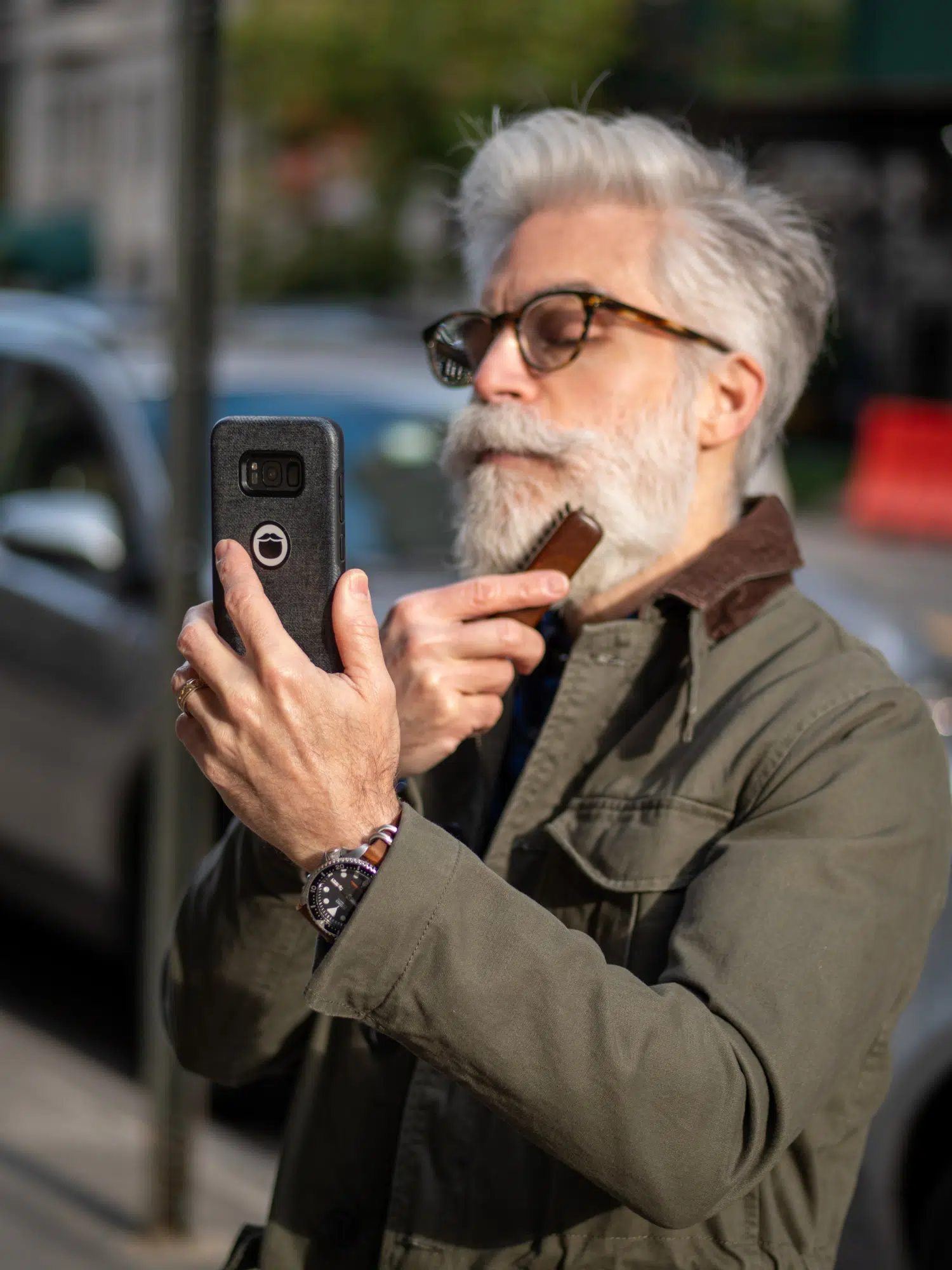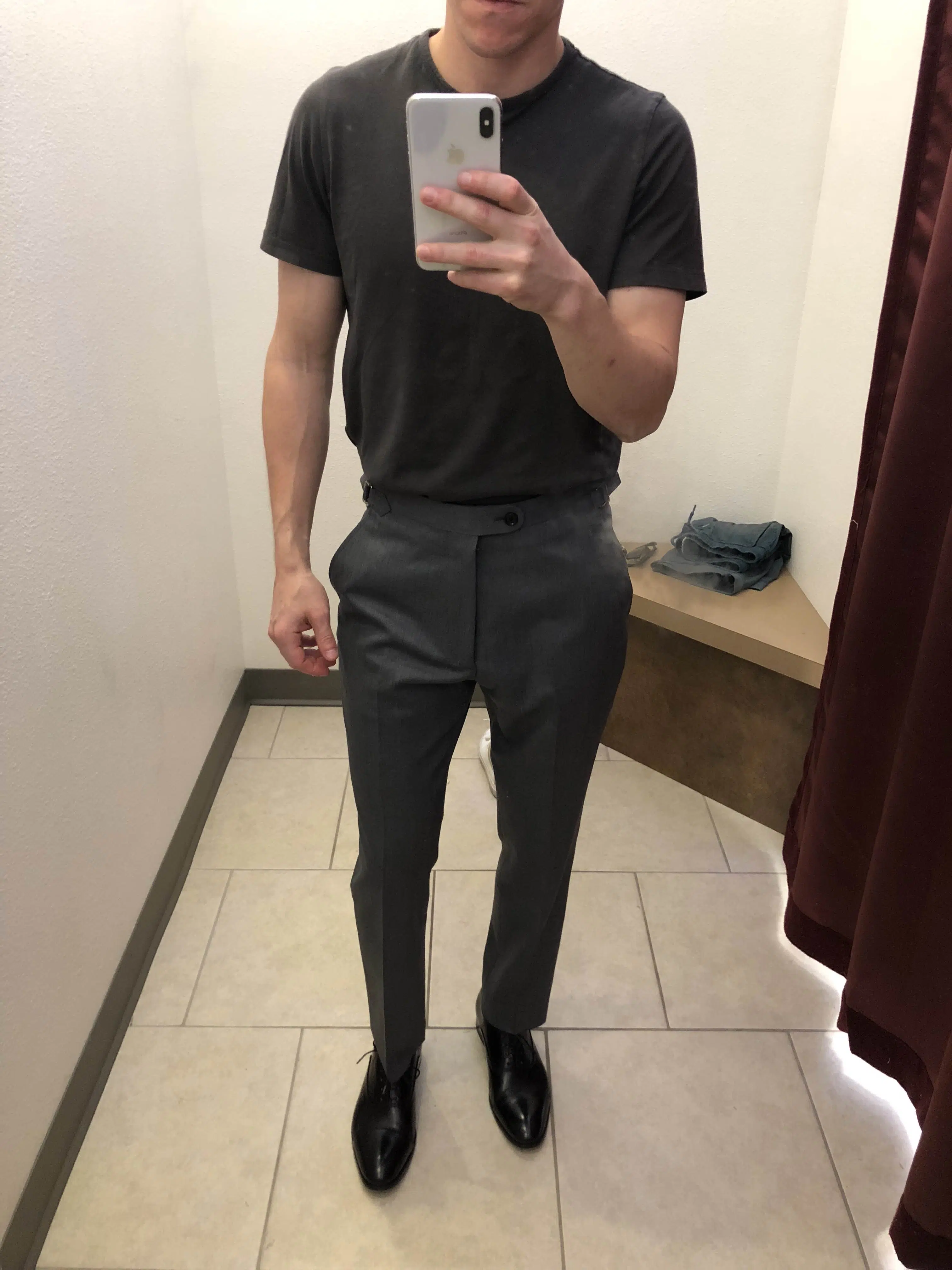It’s healthy to care about the way you look, but do you care too much? This article will show you how to care less.

So, you’ve started to care about your appearance. What happens when you start to care a little bit too much? In this article, we’ll discuss how to avoid becoming overly preoccupied with the way you look. We also talk about how to grapple with body dysmorphia.
Caring about how you look isn’t a bad thing. It doesn’t mean you’re obsessed with your appearance.
It’s healthy and normal to look in the mirror before you go out the door in the morning.
If you have a hard-to-fit body type, taking clothes to a tailor isn’t vanity — it is a necessity if you want to be viewed by others as a competent adult.
Likewise, buying quality clothes that last isn’t a sign of obsession.
Neither is using a hairdryer or taking care of your skin.
Even buying a third pair of white minimal
But there is a point at which caring becomes obsessing. This can lead to wasting time and money and missing out on quality time with other people.
It can even lead to (or be caused by) more serious disorders like body dysmorphia.
How do you know if you care too much about how you look?
Let’s Start With a Story
In the moment, it can be hard to recognize when you’re overly fixated on your appearance.
This is perhaps best explained through an old story:
Wandering through the woods, a strong, good-looking young man encounters a nymph who curses him for his evil deeds. Scoffing at the idea of “a curse,” the man kneels by a pool of water to take a drink. In that moment, he notices his own image staring up at him and he immediately falls in love with his own reflection.
Eventually, after many days of sitting in front of the pool endlessly staring at himself, he wastes away and dies of starvation.
That young man’s name was Narcissus.
In this extremely abbreviated version of the ancient Greek myth of Narcissus (which I’ve adapted here by combining elements from several versions of the story), the young man doesn’t realize that his life is not his own.

Paradoxically, in the very period in which he’s obsessed with his seemingly perfectly formed body, his once muscular, youthful form is deteriorating. In other words, as time progresses, the further the distance his mental image of himself gets from reality.
While not as extreme as Narcissus, many men live in a world in which their day-to-day lives are negatively impacted by their preoccupation with their own appearance.
What Is Body Dysmorphia?
I discovered that this kind of thinking is not a simple case of inflated hubris — it is an actual medical condition. While researching this topic, I contacted Dr. Jake Veigel, a sports and exercise medicine doctor in Salt Lake City (and long-time The Modest Man reader).

Dr. Veigel told me that being overly preoccupied with one’s appearance is called “body dysmorphia” in the medical world.
This condition is a spectrum, ranging from mild to severe. Generally, body dysmorphia manifests itself differently in men than it does in women.
Women tend to change their diet in an attempt to form a “perfect body,” sometimes to the point that they stop eating altogether. This is extremely dangerous and, sadly, often leads to health complications and sometimes even death.
Men, on the other hand, are more likely to experience what is referred to as “muscle dysmorphia.”
In extreme cases, there are guys that want to appear as big and as muscular as possible. They can end up going to the gym for three hours a day or more to the detriment of all other areas of their life. In their mind, these people think that they are never big enough or ripped enough.
Dr. Veigel told me that this self-perceived disparity between the “ideal body” and their own body (even if only in their head) sometimes leads to suicide.
What Causes Body Dysmorphia (Or Preoccupation About Your Appearance)?
In short, body dysmorphia is an anxiety disorder caused by an intense urge to compare oneself to others.
Although people have always compared themselves to those around them, social media has created a treacherous digital environment that has real-world consequences for the self-images of millions of people.
I should mention that, contrary to popular belief, social media itself does not make people compare themselves to each other — your brain does.
That said, as Dr. Veigel explained, social media use does seem to be a factor. The relentless comparison it enables appears to amplify the problem of body dysmorphia.
An article in Grey Matters, Temple University’s neuroscience publication, supports Veigel’s observation. The article reports that:
For individuals with BDD [body dysmorphic disorder], … reinforcement is focused more on … negative feedback. Since the rewards found online (i.e. amount of likes and comments) are easily measurable, someone with BDD might engage in more social comparison online. This is when one compares their own rewards gained through social networks with others. It is this social comparison that contributes to negative effects on self-esteem.
Aside from heavy social media users, it seems that athletes are more prone to body dysmorphia than the average person.
Dr. Veigel told me that muscle dysmorphia is 6 times higher among athletes than it is among the general population (roughly 12% and 2%, respectively).
In his experience, it is most common among people who are concerned about their aesthetics. Among male athletes, body builders seem to be the most likely to develop muscle dysmorphia.
However, if you happen to be an athlete that uses social media a lot, that doesn’t mean that you have BDD; it just means that it’s something that you should pay attention to.
How to Tell if You’re Obsessed With Appearance
For many people, it can be hard to recognize whether or not they are overly concerned about their appearance.
At this point, you might be wondering, “How can I tell if I have a problem?”
Dr. Veigel put it bluntly:
It becomes a problem when it becomes a problem.
You move over into the realm of “obsession” or potentially diagnosable body dysmorphia when worrying about your appearance takes over your thoughts and keeps you from living fully in the moment.
So, be honest with yourself in answering the question, “Do I have a problem?”
If you’re still not sure, here are 7 helpful questions to ask yourself:
- Can I not help but look at my reflection every time I walk past a mirror or a reflective storefront, even if I’m having a good time with friends or family?
- Do I exercise for 3 hours or more every day?
- Do I spend more time shopping for clothes online than I do reading books and articles to improve myself, learn a new skill, or get ahead in my career?
- Do I miss important events or avoid hanging out with friends to avoid encountering food that isn’t part of my strict diet?
- When I have an event coming up, do I always plan what I’ll wear weeks or months ahead, down to every last detail?
- Do I post pictures of almost everything I wear on Instagram?
- Do I never seem to be satisfied with how my clothes fit, despite regular visits to a competent tailor?
Answering “yes” to any of these questions doesn’t necessarily mean that you are over preoccupied with your appearance or have muscle dysmorphia. However, you should take time to consider whether or not you have a problem.
In particular, Dr. Veigel indicated that, for most people, exercising for 3 hours or more a day is a red flag. While this excludes professional athletes, remember that even they have an off-season.

Aside from considering these questions, you could also talk to a trusted friend or family member and ask them if they think that you are preoccupied with your appearance. Try to listen to their feedback without attempting to justify yourself.
Now, considering how you answered the questions above and taking the feedback from others into account, be brutally honest in once again asking yourself the question, “Do I have a problem?”
If preoccupation over how you look is affecting your day-to-day life, take measures to regain control.
How to Regain Focus on What Really Matters
If upon introspection you realize that you do have a problem, that your thoughts about your appearance are compulsive and are affecting you negatively, realize that you’re not a bad person. Your brain just needs to shift priorities.
Here are a few simple things that you can try to recenter and return to a place of mental clarity.
Moderate Your Social Media Use
While preparing to write this article, I reached out to members of The Modest Man Facebook Group, asking for people to share their experiences with unwanted thoughts about their appearance that negatively affect their day-to-day life.
One member of the group said:
[I’m] someone who went from never thinking about clothes, to overly obsessed with appearance, to (somewhat recently) recovering into some sort of equilibrium…
At this point, I know how to dress well enough for any occasion. I’m not too picky about fit anymore.
I think [that] social pressure, amplified by the internet, can lead to more obsession with appearance, and I don’t think it’s helpful.
For this reason, I try not to spend much time on social media…
While social media admittedly isn’t the cause of obsessive thoughts, that doesn’t mean that you shouldn’t moderate your social media use.
In moderation, social media can be a useful tool. In excess, social media can be a major drain on your time and energy.
In a 2014 study, researchers have found that “participants who used Facebook most often had poorer… self-esteem” than those who used Facebook less frequently. Other studies have come to similar conclusions. (Interestingly enough, studies funded by Facebook didn’t find this connection…).
Limiting — or even better, eliminating — social media use can help you regain focus in your life.

The simplest and, in most cases, the most effective way to curb social media use is the nuclear option — to delete all of your social media accounts for a while.
In his book, Deep Work, Cal Newport advocates this option (page. 205). After quitting social media for 30 days, he suggests that you ask yourself the following questions before jumping back online
- Would the last thirty days have been notably better if I had been able to use this service?
- Did people care that I wasn’t using the service?
Think about your answers to these questions and decide how you want to use (or not use) social media going forward.

Consider taking Cal’s advice and taking a break from social media. Who knows? You might not even miss it.
After stepping away from your digital persona for a while, if you decide that you still want to be on social media in some form, you may want to use some of the many tools that can help you to limit your use.
For example, you can set up firewalls that limit how long you can access a site on any given day.
Personally, on my laptop I use the Google Chrome plugins Distraction Free for YouTube™ and News Feed Eradicator. I have a personal rule that I only check Facebook (my only social media account) on my laptop, with News Feed Eradicator keeping sessions to just 5 minutes at a time.
For my phone, I use Apple’s “screen time tracker” to monitor how much time I use my phone each week. I also intentionally don’t have any social media apps downloaded onto my phone.
These tools and rules have helped me to save hours that I probably would’ve squandered without them. That said, I still could do much better.
Using tools and hacks isn’t foolproof; you still have to have the self-control to avoid wasting time and maintain your focus.
Change Your Focus
Your mind is like a stage. Over the course of months or years, your mind can get used to that scene being occupied by the dopamine caused by you checking Instagram every five minutes. When you quit the platform, the stage will be empty.
You need to fill that empty space with something positive. If you don’t, nine times out of ten, you’ll find yourself back on in a rut of near compulsive social media use.
Similarly, if you’re used to spending 3 hours a day at the gym, switch things up. Go for a run one day instead of your normal weight training session.
If you’re a gym rat that hasn’t missed a workout in years, take a week off from exercising to lounge on the beach — Dr. Veigel says that might be the best thing you can do for your physical and mental health.
[Exercise] is like any other medicine; you can overdose on it.
Dr. Veigel
Just like it’s good to mix things up if you’re preoccupied with working out, if you’re fixated on clothes it’s also good to change your routine.
TMM founder, Brock, says:
Every now and then, wear something that doesn’t fit perfectly or that you’re not totally happy with. Maybe wear something that’s a bit outside your comfort zone. Once you see that nothing bad happens, you start to understand that this stuff doesn’t matter that much.
Brock
Besides switching things up regularly, to change your focus, you’ll almost certainly need to create other strong habits.

Do this by breaking bad habits and replacing them with good ones that are oriented around what matters to you (e.g. your career, family, others you care about, or hobbies). Doing so will help you recenter.
Take Time To Connect With Others
Time spent thinking of others is time taken away from focusing on yourself.
Dedicate time during your day to think about others. In my opinion, one of the best ways to do this is to talk to people when you have “dead space” during your day. By dead space, I mean time that’s difficult to use productively. Or put more simply, time that most people spend on their phones checking Instagram.
If you’re waiting in line at the bank, talk to the people in front of you instead of checking Grailed. If you’re waiting for the train, instead of browsing r/malefashionadvice, call a friend you haven’t talked to in a few months, just to catch up.
Talking with people has the added bonus of releasing tons of positive neurotransmitters into your brain (a.k.a happy brain chemicals). The resulting boost to your mood can help keep you motivated and more content.
If Needed, Seek Professional Help
If, despite your best efforts, you really can’t seem to stop obsessing about your appearance, don’t be afraid to reach out to a professional for help. These kinds of intrusive thoughts may be symptoms of an underlying neurological or personality disorder such as body dysmorphic disorder.
Dr. Veigel suggests that if you think you might have muscle dysmorphia, first see your family doctor for help. He or she will be able to refer you to specialists if needed. Usually, people with more severe cases of body dysmorphia will need some cognitive behavioral therapy.
Conclusion
While having pride in your appearance is an asset, excessive preoccupation with appearance can be a liability.
If you find yourself obsessed with your appearance, try to moderate your social media use, change your focus, connect with others, and consider consulting a medical professional.
Questions? Comments? Leave them below!






Ask Me Anything